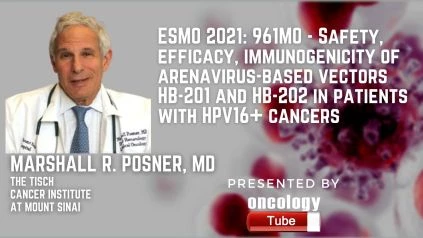Marshall R. Posner, MD, Director of Head and Neck Medical Oncology at The Tisch Cancer Institute at Mount Sinai speaks about the ESMO 2021 Abstract – 961MO – Safety, efficacy, immunogenicity of arenavirus-based vectors HB-201 and HB-202 in patients with HPV16+ cancers.
961MO Abstract:
Background:
HPV16+ malignancies are generated by the persistent expression of HPV16-specific E7 and E6 oncoproteins, which are also sources of immunogenic neoantigens. The replicating arenavirus vectors HB-201 (LCMV) and HB-202 (Pichinde viral) elicit tumor-specific T-cell responses by producing the identical non-oncogenic HPV16 E7E6 fusion protein.
Methods:
In HPV16+ malignancies, a phase I first-in-human research looked at HB-201 monotherapy and HB-201 & HB-202 alternating 2-vector treatment (HB-201/HB-202) given intravenously (IV) with or without one intratumoral dose (IT/IV). Immunogenicity and pharmacodynamic biomarkers in blood and tumor tissue samples were examined, as well as safety, tolerability, and preliminary anti-tumor efficacy using Response Evaluation Criteria in Solid Tumors (RECIST) 1.1 or immunological RECIST.
Results:
With a median (range) of 3 (1–10) previous anticancer treatments, the trial treated 38 patients (29 with 1 efficacy scan) with confirmed HPV16+ malignancies. The oropharynx was the most frequent primary cancer location (76 percent), followed by cervical cancer (7.9 percent ). Eighteen patients got IV HB-201 monotherapy, nine IT/IV, and eleven patients received alternating HB-201/HB-202 treatment. In general, the treatment was well tolerated. Twenty patients (53%) experienced treatment-related side effects (all of which were Grade 2). Two of the 11 patients who received HB-201 IV every three weeks showed a partial response (including one unconfirmed immunological full response of the target lesion) and six had stable disease (SD) for 1.2–5.9 months. SD was seen in all six evaluable patients who received HB-201/HB-202. Through direct ex vivo activation, HPV16-specific T-cells in the peripheral blood were identified at multiple time points after injection. Immunogenicity data for various schedules, regimens, routes of administration, and dosages will be given. It will be addressed how to get to the suggested phase II regimen.
Conclusions:
In this extensively pretreated cohort of patients with HPV16+ malignancies, the arenavirus-based vectors HB-201 and HB-201/HB-202 seemed well tolerated and exhibited preliminary anti-tumour efficacy as single treatments. It was discovered that circulating E7E6-specific activated CD8+ T-cells were induced.
Clinical trial identification
NCT04180215.

